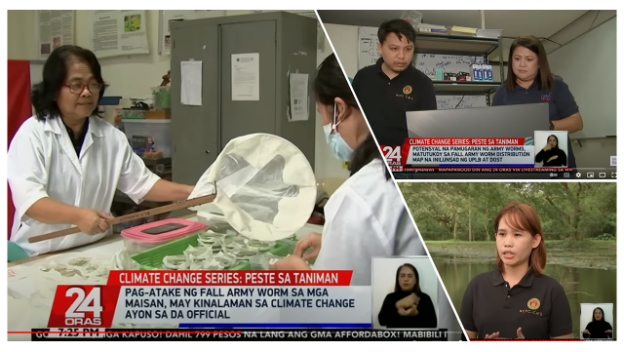Screenshots from 24 Oras, GMA Integrated News Report
Three researchers from the National Crop Protection Center (NCPC) were interviewed at the fourth episode of the Climate Change Special Reports series of 24 Oras. Aired on Jan. 12 on GMA Integrated News Report, Ms. Sandra Aguinaldo interviewed the researchers on the effects of climate change on insects.
Fall armyworm (FAW), locally known as harabas, was the insect pest highlighted in the report. It is a transboundary pest that was first reported to infest the Philippines in 2019. It has now spread to different regions.
In the episode, Ms. Aguinaldo interviewed a farmer from Ilagan, Isabela, the corn capital of the Philippines. The province has been known to have high FAW infestations. According to Mr. Danilo Tamayo, the 40-year corn farmer interviewed, he only started experiencing FAW problems when the climate changed—when the rainy season became erratic from the usual rainy season. Based on his experience, he can only harvest around 30-40% of the expected yield when FAW attacks his field. From this, we can imagine the tremendous effect of FAW on food security.
The news report featured the NCPC laboratory which rears and mass produces FAW and other insects. The mass production of insects is essential to support the Center’s research studies on developing pest control strategies. In the interview, Scientist Marcela M. Navasero, a university researcher of NCPC, shared that climate change favors the outbreak of armyworms, “Sa kasalukuyan ang mga armyworms ang mga grupo ng peste na napaboran ng climate change.”
Aside from insect pests, climate change also affects the development of crop diseases, according to Ms. Sarah Jane B. Manaday, NCPC university researcher, and Ms. Minda Flor M. Aquino from the Department of Agriculture-Regional Crop Protection Center (DA-RCPC ) II during the interview. Ms. Manaday said that climate change favors the development of rice blasts and coffee rust and that some diseases may cause 50-100% yield reduction.
To reduce the impact of FAW, the UPLB and the Department of Science and Technology will launch a FAW distribution map. In the same interview, Mr. Gideon Aries A. Burgonio, also a university researcher, explained that the map could show the areas with high and moderate potential FAW outbreaks, which can guide the local agriculture technicians and farmers to prepare for possible FAW outbreaks.
Meanwhile, the regional offices of the DA distributed earwig, an insect that can eat armyworms, and Trichoderma and Metarhizium anisopliae (fungi) to control armyworms at different stages.
The impact of climate change is not only observed in the changing weather but also felt in food production. Hence, actions to adapt to climate change through agriculture are essential.
The full news report can be watched at https://www.youtube.com/watch?v=31rRmu_p0Tw.
(First published at the Aggie Green & Gold newsletter, January 2023 issue)








